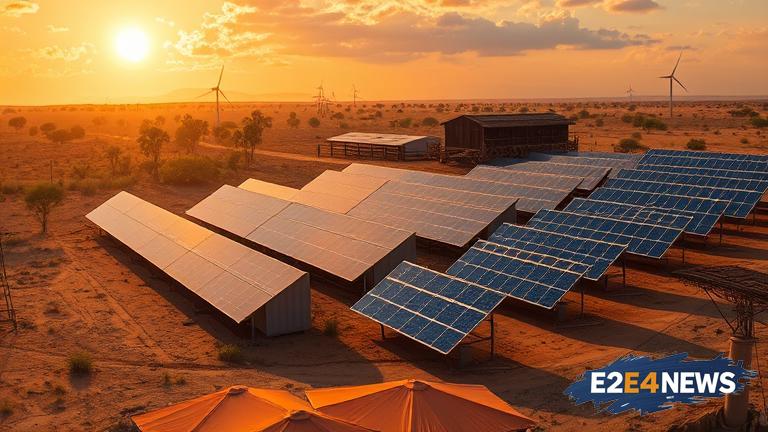The African continent is witnessing a significant shift towards renewable energy, driven by the need to address the pressing issues of energy access, energy security, and climate change. With many countries still struggling to provide reliable and affordable electricity to their citizens, renewable energy has emerged as a viable solution. Solar and wind power are leading the charge, with countries like South Africa, Egypt, and Morocco investing heavily in these sectors. The cost of renewable energy technologies has decreased dramatically over the years, making them more competitive with fossil fuels. This has led to a surge in investment, with many international companies and organizations committing to support Africa’s renewable energy ambitions. The African Union’s Agenda 2063 has set a target of ensuring access to clean and affordable energy for all Africans by 2030. To achieve this, the continent will need to increase its renewable energy capacity significantly. Several countries have already made notable progress, with Kenya, for example, generating over 70% of its electricity from renewable sources. Rwanda has also set an ambitious target of becoming a carbon-neutral economy by 2050. The benefits of renewable energy are numerous, including reduced greenhouse gas emissions, improved air quality, and enhanced energy security. Moreover, renewable energy can create jobs, stimulate local economies, and contribute to sustainable development. However, there are still significant challenges to overcome, including the lack of infrastructure, limited access to financing, and the need for policy and regulatory frameworks that support the development of renewable energy. Despite these challenges, the future of renewable energy in Africa looks promising, with many experts predicting that the continent will become a global leader in the sector. The International Renewable Energy Agency (IRENA) has estimated that Africa could generate up to 25% of its electricity from solar power by 2030. This would not only help to reduce carbon emissions but also provide energy access to millions of people currently living without electricity. In addition to solar and wind power, other renewable energy sources like hydro, geothermal, and biomass are also being explored. The private sector is playing a crucial role in driving the growth of renewable energy in Africa, with companies like Vestas, Siemens Gamesa, and Goldwind investing in wind and solar projects across the continent. Governments are also providing support through policies and incentives, such as tax breaks, feed-in tariffs, and renewable energy auctions. The African Development Bank has launched a number of initiatives to support the development of renewable energy, including the Sustainable Energy Fund for Africa (SEFA) and the Renewable Energy Development Facility (REDF). These efforts are helping to build a more sustainable and resilient energy system, one that will support the continent’s economic growth and development for generations to come. As the world transitions towards a low-carbon economy, Africa is well-positioned to play a leading role in the global renewable energy market. With its abundant natural resources, growing economies, and increasing demand for energy, the continent has the potential to become a major player in the sector. However, to realize this potential, African countries will need to continue to invest in renewable energy, improve their policy and regulatory frameworks, and attract more international investment. By doing so, they can unlock the many benefits of renewable energy, including job creation, economic growth, and a more sustainable future.
